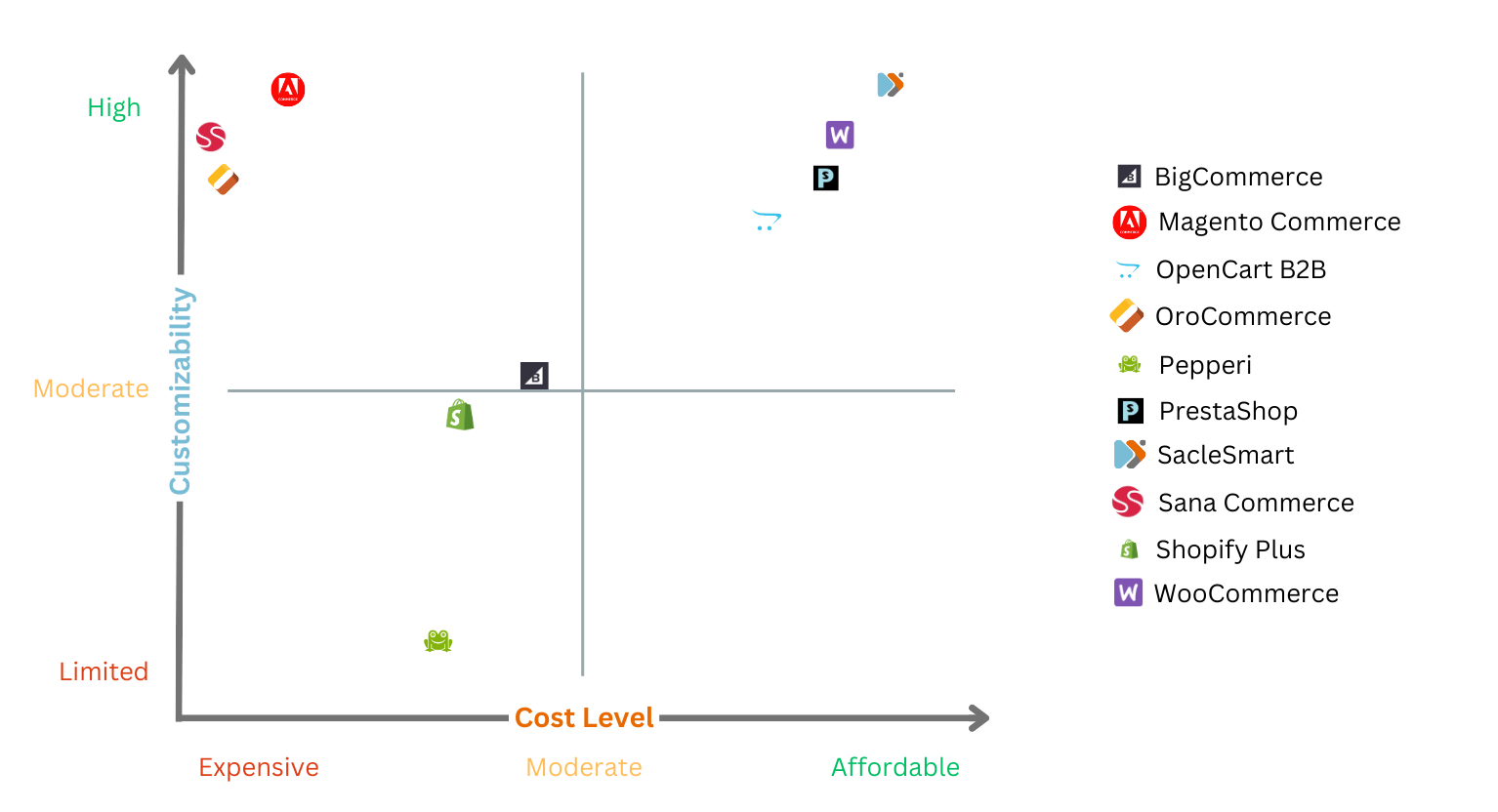The Ultimate Guide to Choosing the Best B2B Ecommerce Platforms
In today’s digital economy, customers expect a seamless and efficient digital experience that optimizes their interactions with your business. From seamless ordering processes to personalized account management, the expectations for efficiency, speed, and actionable information in B2B commerce are higher than ever.
While the core functionalities required in a B2B commerce platform often overlap across industries, every business has unique needs that reflect its specific market position, operations, and customer base.
Many platforms advertise lower costs and user-friendly setups, which can appear highly appealing at first glance. However, as businesses identify the distinctive elements that set them apart and aim to incorporate those into their digital platforms, they often encounter limitations. These systems, while accessible, tend to restrict customization and fail to support the tailored customer experiences necessary to thrive in today’s competitive landscape.
Understanding your position in the customer journey and aligning your platform with your growth trajectory is essential. Recognizing the level of customization, scalability, and integration you’ll need to meet your long-term goals is the foundation of making the right decision.
Click here to explore our blog on the critical questions you need to ask before selecting a B2B platform.
Selecting the right B2B e-commerce platform is a pivotal decision in a fast-evolving digital landscape. The ideal solution will not only streamline your operations but also elevate the customer experience. Features like ERP integration, scalability, robust customer support, and a pricing model that fits your current budget while scaling alongside your business are critical considerations. This article delves into the essential features to evaluate and offers a comprehensive comparison of leading platforms.
Key Features Essential in a B2B E-commerce Platform to Support Your Growth
Selecting the right B2B e-commerce platform is critical to driving sustainable growth and meeting customer expectations. Below are the essential features your platform must offer to support your evolving business needs:
- User-Friendly Interfaces
A seamless and intuitive user experience is key to ensuring efficiency and customer satisfaction. Your platform should provide a straightforward interface that minimizes friction for both your customers and internal teams, enabling faster adoption and smoother operations.
- Robust Integrations
The ability to integrate seamlessly with existing systems such as ERP, CRM, and accounting software is essential for streamlining operations. These integrations eliminate manual processes, reduce errors, and provide a unified ecosystem to manage your business more effectively.
- Scalability
As your business grows, your e-commerce platform must scale effortlessly to handle increased traffic, larger product catalogs, and more complex workflows. Scalability ensures your operations remain smooth, even during periods of rapid growth or high demand.
- Personalized Experiences
Advanced customization options allow businesses to tailor user journeys to individual customer needs. From personalized catalogs to dynamic pricing, the ability to deliver tailored experiences can significantly enhance customer satisfaction and loyalty.
- A Cost That Fits Your Budget
Your platform's pricing structure should align with your current financial constraints while providing room for growth. Look for a solution that offers transparency in pricing, minimizes hidden costs, and adjusts based on your evolving business size and needs. Additionally, consider the total cost of ownership, which includes not just the initial investment but also ongoing expenses such as maintenance, upgrades, and any necessary third-party integrations. Balancing affordability and functionality is key to maximizing your ROI.
- Speed to Market
In today’s fast-paced digital economy, the ability to deploy your e-commerce platform quickly is crucial. Platforms with rapid deployment capabilities—such as pre-configured tools and out-of-the-box functionality—enable you to start generating revenue faster. A platform that reduces time-to-market empowers your business to adapt to changing demands and seize opportunities ahead of competitors. - Security and Compliance That Protects Your Business
A secure platform is essential for safeguarding your business and customer data. Look for a solution that offers robust security measures, such as encryption, regular security updates, and protection against cyber threats. Ensure the platform complies with relevant industry standards and regulations, such as GDPR, PCI DSS, or HIPAA, depending on your business's requirements. Prioritizing security and compliance not only protects your operations but also builds trust with your customers and partners. Balancing strong security with ease of use is critical to maintaining efficiency and peace of mind.
Comparison of Top B2B E-commerce Platforms
Please note that the costs shown represent average starting costs and do not include setup or customization expenses. This chart helps businesses evaluate platforms by balancing flexibility with budget requirements.
| B2B Platforms | Scalable | Security Risk | Customizability | Advanced Inventory | Cost Level |
|---|---|---|---|---|---|
| SacleSmart B2B | ✔ |
Low | High | ✔ |
Affordable |
| PrestaShop | ✖ |
Moderate | High | ✔ |
Affordable |
| OpenCart B2B | ✔ |
High | High | ✖ |
Affordable |
| WooCommerce B2B | ✔ |
Moderate | High | ✔ |
Affordable |
| BigCommerce Enterprise | ✔ |
Low | Limited | ✖ |
Moderate |
| Pepperi B2B eCommerce | ✔ |
Low | Moderate | ✖ |
Moderate |
| Sana Commerce | ✖ |
Moderate | Moderate | ✔ |
Expensive |
| Shopify Plus | ✔ |
Low | Limited | ✖ |
Expensive |
| OroCommerce | ✔ |
Moderate | High | ✖ |
Expensive |
| Magento Commerce (Adobe Commerce) | ✔ |
Moderate | High | ✖ |
Expensive |
Visual Comparison Quadrant
This quadrant visually compares leading B2B platforms based on their customizability (ranging from limited to high) and cost levels (affordable to expensive). It helps businesses identify the ideal platform by balancing customization needs with budget constraints.

Conclusion:
selecting the optimal B2B e-commerce platform is a critical decision that can significantly influence your business's growth and customer satisfaction. It's essential to choose a solution that not only meets your current operational needs but also scales with your business, integrates seamlessly with existing systems, and offers a user-friendly experience. Prioritizing features such as robust integrations, scalability, personalized experiences, cost-effectiveness, rapid deployment, and stringent security measures will position your business to thrive in the competitive digital marketplace. By aligning your platform choice with your strategic objectives, you can enhance efficiency, foster stronger customer relationships, and drive sustainable growth.



